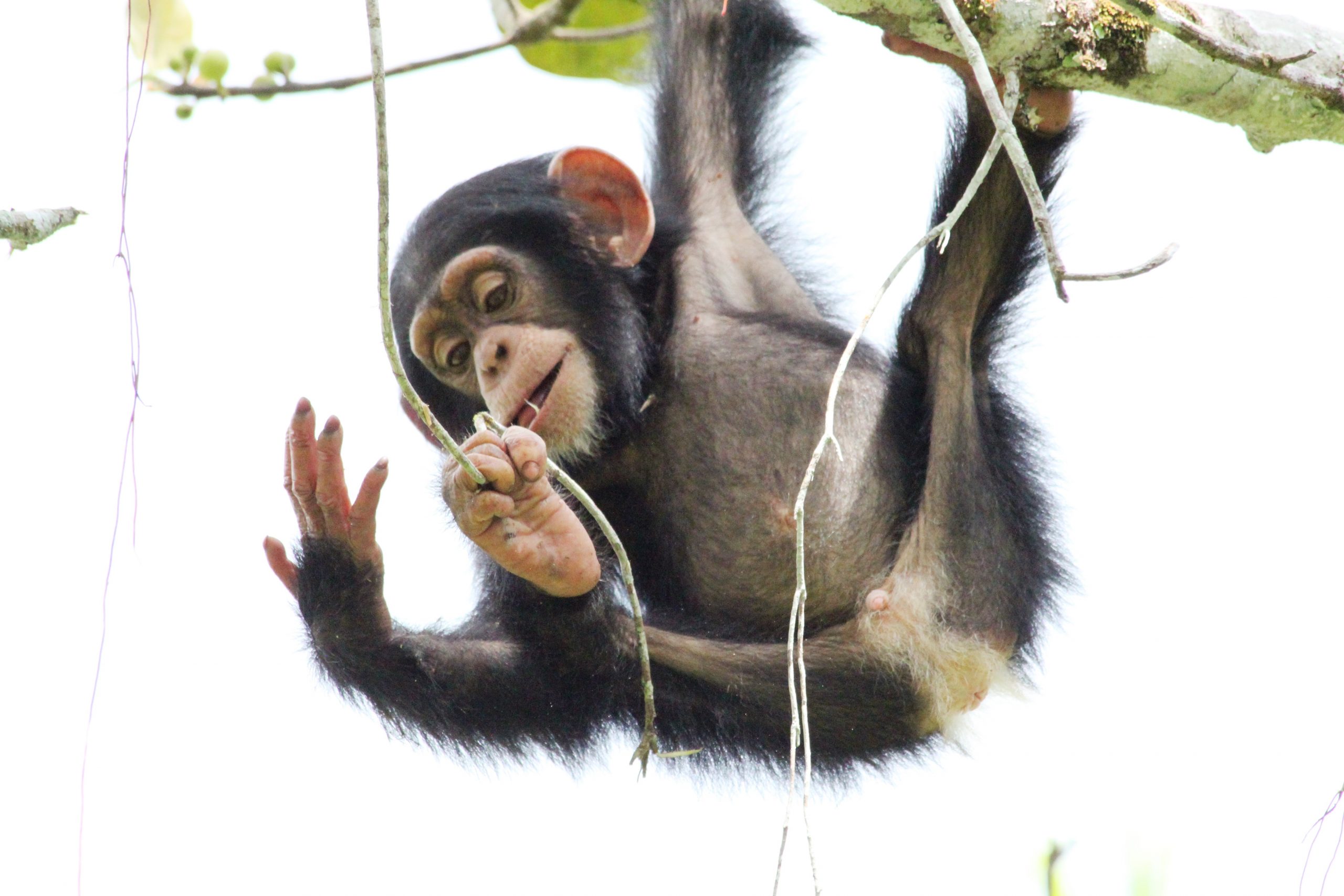
Research by Kathelijne Koops casts new light on the evolution of tool use.
Insights into the tool use difference between chimpanzees and bonobos can help us identify the conditions that drove the evolution of human technology.
Kathelijne Koops
A new study has shown the first evidence of a species difference in the innate predisposition for tool use in our closest evolutionary cousins and could provide insight into how humans became the ultimate tool-using ape.
The study, led by Gates Cambridge Alumna Dr Kathelijne Koops and published in the journal Scientific Reports, investigates the question of 'what makes a tool user?', which is a key one in human evolution, and the origins of human tool mastery could lie in the gulf between tool use in chimpanzees and bonobos. Chimpanzees and bonobos are the two closest living relatives of the human species, but differ hugely in the way they use tools. Chimpanzees show the most diverse range of tool use outside of humans while bonobos rarely use tools and never to forage for food.
Koops, in collaboration with colleagues from Kyoto University, conducted painstaking research tracking communities of wild chimpanzees and bonobos in Uganda and Congo for months, cataloguing not just all tool use, but also all potential for tool use in terms of the different environments and social time spent.
They also investigated the innate propensity for object manipulation in young apes, regardless of whether said object was deployed as a 'tool' – the first wild inter-species comparison of its kind.
The researchers found that environmental opportunities did not explain the difference in tool use. From nut trees to ant nests, stones to shrubs, the bonobos had access to as many tools and promising foraging opportunities in their stomping ground as the chimpanzees.
Nor did social opportunities. In fact, young bonobos spent more time with their mothers, and had more individuals in close proximity for more time whilst feeding than young chimpanzees. Young bonobos also had more social partners than young chimpanzees.
However, immature chimpanzees manipulated and played a lot more with objects than bonobos, and played with objects on their own. This was a difference already visible in very young individuals, says Koops. In fact, she says this is the first evidence for a species difference in the innate predisposition for tool use in our closest evolutionary cousins.
"Chimpanzees are object-oriented, in a way that bonobos are not," said Koops, who conducted the work at Cambridge University's Division of Biological Anthropology and at Zurich University's Anthropological Institute and Museum.
"Given the close evolutionary relationship between these two species and humans, insights into the tool use difference between chimpanzees and bonobos can help us identify the conditions that drove the evolution of human technology. Our findings suggest that an innate predisposition, or intrinsic motivation, to manipulate objects was likely also selected for in the hominin lineage and played a key role in the evolution of technology in our own lineage," she said.
Koops [2006] has recently finished a PhD in Biological Anthropology, with support from the Gates Cambridge Trust.

Kathelijne Koops
- Alumni
- Netherlands
- 2006 PhD Biological Anthropology
- St John's College
I obtained my MSc in Biology at Utrecht University in the Netherlands before attending the University of Cambridge, where I completed my PhD in Biological Anthropology in 2011. Subsequently, I was a Junior Research Fellow at Homerton College and a Post-doctoral researcher in the Department of Archaeology & Anthropology at Cambridge. In 2014 I took up a Post-doctoral position at the University of Zurich. In 2020-2021 I was a Lecturer in Primatology in the Department of Archaeology at the University of Cambridge. Since 2021, I am a Professor in the Department of Evolutionary Anthropology at the University of Zurich in Switzerland.
My research applies an interdisciplinary approach to investigating the evolution of tool use. Complex technology is a defining trait of our species. Human technological innovations have reshaped our planet and changed the impact of evolutionary forces upon our lives. Despite the enormous significance of human technology, the evolutionary origin of this complex use of tools is not well understood. By studying humans’ closest living relatives, the great apes, I hope to identify the processes driving the use of technology across ape species and, in turn, shed light on What makes us human?
Previous Education
Utrecht University M.Sc Biology 2005

Kathelijne Koops
- Alumni
- Netherlands
- 2006 PhD Biological Anthropology
- St John's College
I obtained my MSc in Biology at Utrecht University in the Netherlands before attending the University of Cambridge, where I completed my PhD in Biological Anthropology in 2011. Subsequently, I was a Junior Research Fellow at Homerton College and a Post-doctoral researcher in the Department of Archaeology & Anthropology at Cambridge. In 2014 I took up a Post-doctoral position at the University of Zurich. In 2020-2021 I was a Lecturer in Primatology in the Department of Archaeology at the University of Cambridge. Since 2021, I am a Professor in the Department of Evolutionary Anthropology at the University of Zurich in Switzerland.
My research applies an interdisciplinary approach to investigating the evolution of tool use. Complex technology is a defining trait of our species. Human technological innovations have reshaped our planet and changed the impact of evolutionary forces upon our lives. Despite the enormous significance of human technology, the evolutionary origin of this complex use of tools is not well understood. By studying humans’ closest living relatives, the great apes, I hope to identify the processes driving the use of technology across ape species and, in turn, shed light on What makes us human?
Previous Education
Utrecht University M.Sc Biology 2005












